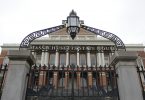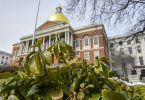By Brittany Chang
Boston University Statehouse Program
This article was originally published in Sentinel & Enterprise.
BOSTON — Two months after the start of the current fiscal year, state lawmakers are still figuring how to spend $150 million of an estimated $1.2 billion surplus left over from the year that ended June 30.
The region’s lawmakers want to use the surplus on education, fixing roads and bridges and supplanting the state’s rainy day fund.
“Not just in Fitchburg, but schools across the commonwealth have decaying buildings that are old and need to be rehabbed substantially or have new buildings be rebuilt, so we need more money into that fund,” said state Rep. Stephan Hay. “All of the money should go to infrastructure and public schools.”
The Fitchburg Democrat said when the Legislature formally reconvenes in January he will refile a bill designating the surplus be used for funding education and highways.
State Rep. Natalie Higgins agrees with Hay.
“We’ve been dealing with chronic underfunding of so many things,” said the Leominster Democrat. “We see it in our roads and bridges. We see it in our school system. We see it in our higher education system.”
State Sen. Dean Tran is more focused on using the surplus for infrastructure improvements.
“The best way to use this money is to help towns and cities fix their roads and provide them additional funding to pave the streets that many complain about,” said the Fitchburg Republican. “Infrastructure is a big issue in my district and across the commonwealth, and I don’t believe we have been investing enough money into our infrastructure.”
Although the Department of Revenue’s September mid-month revenue report indicates that while tax collections were up 38.4 percent in compared to the same period last year, the fiscal surplus is not guaranteed to happen again. Therefore, some lawmakers are hesitant to commit to spending increases which may be difficult to maintain in the future.
“We need to be careful to balance increases to operational spending and capital spending,” said Gardner state Rep. Jon Zlotnik, a Democrat. “I would suggest directing money to infrastructure to help clear local backlogs of work. I think this will round off a surplus spending plan that holds with fiscally responsible principles. Some is saved, some is invested, and some is spent.”
Like Zlotnik, Rep. Jennifer Benson said spending on one-time projects would be the best way to use the surplus money.
The projects don’t have to be limited to just infrastructure, she said. Funds could also be used to purchase equipment for local police departments or to install security systems in schools.
“There’s tons of ways cities and towns could benefit from this money,” she said.
There are local infrastructure projects that have fallen by the wayside that could be supported by the surplus, said the Lunenburg Democrat, like updates to the Ayer MBTA station.
Baker’s proposal called for $72 million in new school spending as well as setting aside money for infrastructure repairs, the opioid crisis and to close gaps in spending in other accounts. About half of the surplus would be shifted to the state’s stabilization fund, bringing the total to an estimated $1.8 billion.
Other proposed Baker uses of the surplus include clean water projects and transitional housing aid for Puerto Rican hurricane evacuees.
Public school funding was a highly debated topic in the Legislature this year. The House and Senate failed to agree on how to increase school funding. However, some lawmakers were cool on allocating money toward causes that do not go directly into city and town budgets as local aid, including state Sen. Anne Gobi
“I think we have to take a look at (the surplus and) make sure we have enough money in our rainy day (fund) because economies continue to fluctuate,” said the Spencer Democrat. “We know it’s not ‘if we’ll have another recession,’ it’s when it’ll happen.”
Although the Department of Revenue’s September mid-month revenue report notes that while tax collections were up 38.4 percent in compared to the same period last year, the fiscal surplus is not guaranteed to happen again.
Sentinel & Enterprise staff reporter Mina Corpuz contributed to the reporting of this article.





